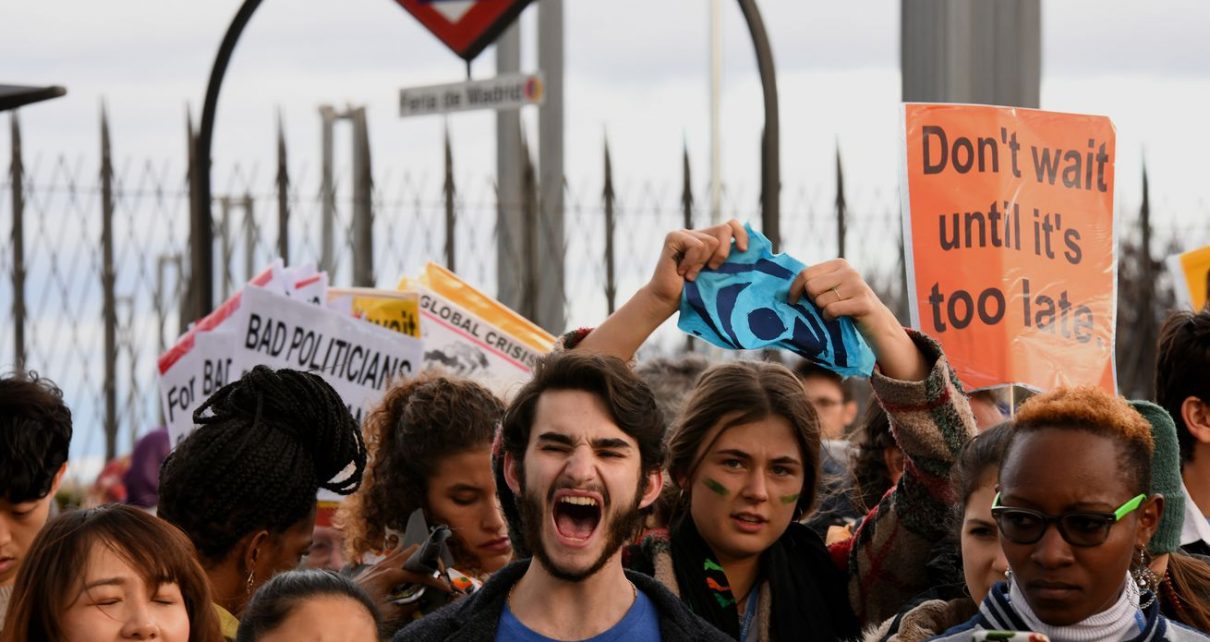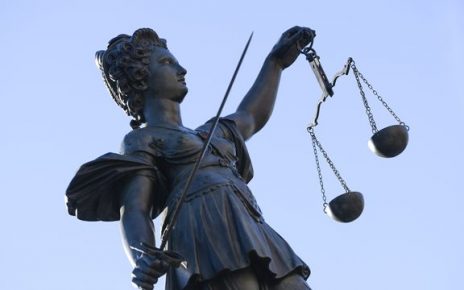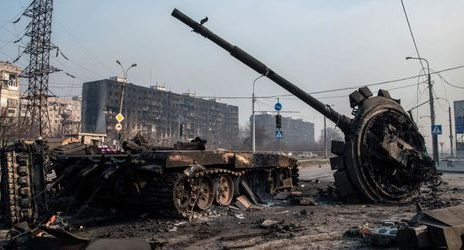
“The only thing that is missing is the actual will to do something, to change for the better.”
This week is the fifth anniversary of the Paris climate accord, the ambitious international agreement to address climate change that more than 190 countries signed on to in 2015.
President Donald Trump dealt a major blow to the agreement when he pulled the United States out of it this November, making the US the only country in the world to back out of the accord. President-elect Joe Biden has promised to recommit the US to the deal on “day one” of his presidency, and plans to feature climate change as a central issue in his administration.
But after rejoining, many experts say the US and the rest of the world will need to make stronger commitments if limiting global warming to 2 degrees Celsius and avoiding the most catastrophic impacts of climate change is to be possible. Higher-income countries will also need to mobilize funds to help lower-income ones respond.
Consideration of future generations and the shared desire to leave behind a livable planet for them helped inspire international collaboration on the accord — championed in large part by members of those future generations.
Young climate activists around the world, from Sweden’s Greta Thunberg to Uganda’s Vanessa Nakate, have led protests and climate strikes to raise awareness of the climate emergency and to urge world leaders to act now, and aggressively, to address the crisis.
Due to the coronavirus pandemic, Cop 26, the 26th session of a United Nations climate change conference originally scheduled to take place from November 9 to 19 in Glasgow, Scotland, was rescheduled. The conference, which brings together countries from around the world to discuss climate change, will now happen in November 2021.
Undeterred by the cancellation and determined to have their voices heard, youth representing more than 140 countries, many from countries in the Global South (Africa, Asia, Latin America, and parts of Oceania), participated in a virtual Mock COP26 event, which began on November 19 and wrapped up on December 1.
Ahead of the event, which featured an opening address from COP26 President Alok Sharma, youth activists set up a “loss and damage” coalition. Loss and damage refers to the human and economic costs of climate change, which have disproportionately burdened developing countries. Greenhouse gas emissions from wealthier countries are fueling the climate emergency in poorer ones.
Before the conference began, the young activists released an open letter to Sharma, UK Prime Minister Boris Johnson, and the rest of COP leadership to make loss and damages a permanent agenda item in future climate negotiations and to provide more financial support to developing nations with the same level of decisive action taken in the international response to the coronavirus pandemic.
“Young people and future generations cannot be the victims of the apathy and inaction demonstrated by today’s decision makers. COVID-19 has shown us how quickly and boldly governments can take action in a crisis; it’s time to do the same for loss and damage,” their letter reads.
At the end of the two-week conference, the activists called on world leaders to adopt some of the considerations offered in their treaty.
To commemorate the fifth anniversary of the Paris agreement, we asked five young climate activists from around the world who participated in the Mock COP26 event: What are your hopes for the next five years of the Paris agreement? And what’s at stake if stronger action isn’t taken?
Their responses, edited for clarity, are below.
Mitzi Jonelle Tan, 23 (Manila, Philippines)
/cdn.vox-cdn.com/uploads/chorus_asset/file/22160721/Mitzi.jpg) Courtesy of Tan
Courtesy of TanWhat are your hopes for the next five years of the Paris agreement?
I have seen too much destruction and death from the floods. My country has felt too much heartache. For the next five years, I want to see not just targets that actually align with the Paris agreement, but concrete plans on how to achieve those targets.
Because this year’s event was canceled, world leaders have had extra time to plan and to meet the required targets. It is crucial that they prioritize this because it is a matter of life and death.
For the next five years, I want to have hope. I don’t want to be afraid of floods consuming my house anymore. We need proactive climate adaptation policies for countries in the Global South most impacted by the climate crisis.
Rich countries, who are greatly responsible for the climate crisis, need to actively try to make sure that it does not get worse and drastically reduce their carbon dioxide emissions: enough to offset the emissions Global South countries will need to emit in order to develop.
What’s at stake if more serious actions aren’t taken?
The Philippines experienced the strongest typhoon in recorded history this year. Barely a week after that, another typhoon poured a month’s worth of rain in just 24 hours: This was our 21st typhoon of the year, and even more are expected. People were stranded on rooftops, children were swept away by the floods; this is what is happening today.
I am not just fighting for my future; I am fighting for my present. This is what’s at stake if we don’t act urgently and with enough ambition. Filipinos are drowning, and leaders who refuse to act are the stones weighing us down.
Valery del Carmen Salas Flores, 24 (Lima, Peru)
/cdn.vox-cdn.com/uploads/chorus_asset/file/22160740/Valery3.jpg) Courtesy of Salas Flores
Courtesy of Salas FloresWhat are your hopes for the next five years of the Paris agreement?
I really hope we can see ambitious action from governments and stakeholders to comply with what was agreed in Paris and close the “emissions gap.” [The “emissions gap,” as Vox’s Umair Irfan has explained, refers to the difference between what countries have committed to do to limit climate change and what they actually need to do to meet greenhouse gas targets.] I want this issue to be talked about clearly and honestly. We are in a crisis, and we must respond.
I really hope that adaptation and mitigation plans are made at the subnational level in order to have resilient cities and communities for our future. I hope people have a seat at the decision-making table and we have meaningful youth engagement.
But above all, I have a dream: that one day, climate ambition and climate action will be made in favor of the world’s most vulnerable people, considering our common but differentiated responsibilities toward current and future generations.
What’s at stake if more serious actions aren’t taken?
Our future. As simple as that.
Our right to live in a healthy environment will be threatened, and that’s just the tip of the iceberg. We face the threat caused by sea level rise, loss of biodiversity, higher ocean temperatures, and human lives lost due to severe storms and other climate impacts. There could be more climate refugees due to non-habitable conditions and other effects if we don’t act.
Samuel Okorie, 23 (Lagos, Nigeria)
/cdn.vox-cdn.com/uploads/chorus_asset/file/22160736/Samuel2.jpg) Courtesy of Okorie
Courtesy of OkorieWhat are your hopes for the next five years of the Paris agreement?
My hope for the next five years is that it will be participatory and inclusive of youth and youth-led initiatives. I’d also like to see policies made during Mock COP26 be adopted by countries and used as a framework to implement policies that tackle climate change.
What’s at stake if more serious actions aren’t taken?
If stronger action is not taken, we may be at risk to expect more damage even worse than this year’s Covid-19 pandemic. My hopes and dreams for the next five years include industry with net-zero carbon emissions and a sustainable economy. An economy that is nature-driven and cared for by a climate-friendly society.
Lavinia Iovino, 14 (Rome, Italy)
/cdn.vox-cdn.com/uploads/chorus_asset/file/22160706/Lavinia.jpg) Courtesy of Iovino
Courtesy of IovinoWhat are your hopes for the next five years of the Paris agreement?
My hope for the next COP26 is to see real action, to see political leaders acknowledging the seriousness of the situation, the urgency to tackle the climate crisis and act upon it. I hope that politicians will take their responsibilities and create a binding program to reach a zero-carbon economy by 2030, to align with the Paris agreement. To start taking concrete action in order for us, the human race, to save ourselves.
My hope for the next five years is to see the change we’ve been waiting for, and indeed that we need, and be part of it. We know what we have to do — politicians know what is needed; they have signed multiple treaties and agreements. The only thing that is missing is the actual will to do something, to change for the better.
I hope to see humanity taking that step further in order to make that change happen.
What’s at stake if more serious actions aren’t taken?
If action isn’t taken, the whole of humanity is at stake.
If we don’t succeed in limiting the rise in the average global temperature to under 1.5 degrees Celsius, we are done. Floods and droughts will increase in temperature and seriousness, hurricanes and typhoons will destroy more areas and communities; we will be left with an unlivable future and an unlivable present.
Humanity is being threatened like never before, and we cannot let this happen. Everybody’s life is at stake.
Josh Tregale, 18 (Dorset, United Kingdom)
/cdn.vox-cdn.com/uploads/chorus_asset/file/22160733/Josh.jpg) Courtesy of Tregale
Courtesy of TregaleWhat are your hopes for the next five years of the Paris agreement?
I hope that world leaders will come together to address the climate crisis with the urgency and ambition needed to avert such a global humanitarian issue. I hope that an agreement is made that commits to well-considered steps ensuring that we do not exceed 1.5 degrees of warming and that leaders put aside differences and work together.
It is critical that at COP26, delegations acknowledge the devastating impact this emergency is already having on some of the most vulnerable in the world, the very people who have contributed the least to the issue.
I hope that I will be graduating university into a world where, because of a concerted effort, we are now on track to mitigate the catastrophic impacts of climate change and are well on our way to reaching net-zero emissions. I hope that I will graduate into a world in which any practices that threaten the values of human rights and health are stringently challenged.
What’s at stake if more serious actions aren’t taken?
If stronger action isn’t taken, basic human rights are at risk. People will be forced to relocate due to sea level rise and drought. People will lose their lives; others will be living in conditions that cause poor physical and mental health. The quality of life for millions of people and for all future generations is at stake.





